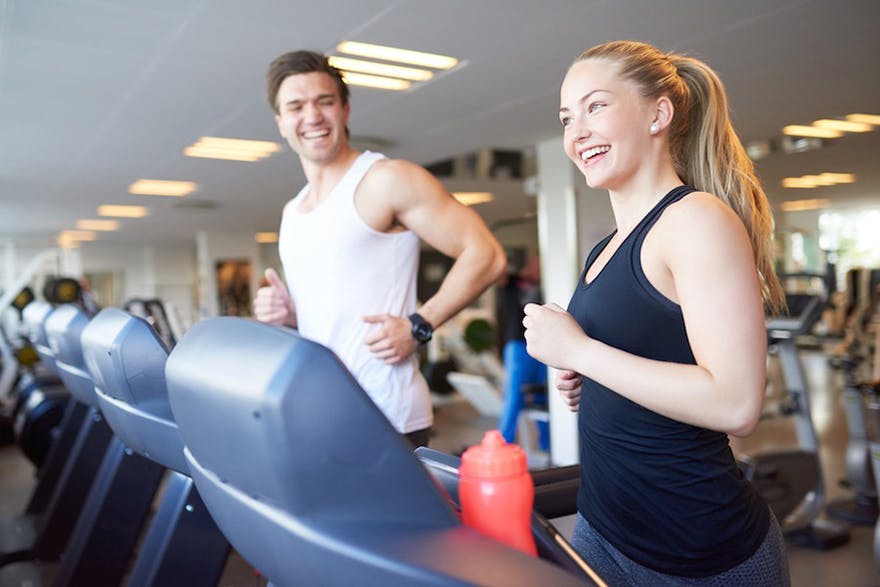Aerobic exercise: Top 10 reasons to get physical
HEALTH & WELLNESS
10.21.2014

Regular aerobic activity — such as walking, bicycling or swimming — can help you live longer and healthier. Need motivation? See how aerobic exercise affects your heart, lungs and blood flow. Then get moving and start reaping the rewards.
How your body responds to aerobic exercise
During aerobic activity, you repeatedly move large muscles in your arms, legs and hips. You'll notice your body's responses quickly.
You'll breathe faster and more deeply. This maximizes the amount of oxygen in your blood. Your heart will beat faster, which increases blood flow to your muscles and back to your lungs. Your small blood vessels (capillaries) will widen to deliver more oxygen to your muscles and carry away waste products, such as carbon dioxide and lactic acid. Your body will even release endorphins, natural painkillers that promote an increased sense of well-being.
What aerobic exercise does for your health
Regardless of age, weight or athletic ability, aerobic activity is good for you. As your body adapts to regular aerobic exercise, you'll get stronger and fitter. Consider the following 10 ways that aerobic activity can help you feel better and enjoy life to the fullest.
Aerobic activity can help you:
Keep excess pounds at bay
Combined with a healthy diet, aerobic exercise helps you lose weight — and keep it off.
Increase your stamina
Aerobic exercise may make you tired in the short term. But over the long term, you'll enjoy increased stamina and reduced fatigue.
Ward off viral illnesses
Aerobic exercise activates your immune system. This leaves you less susceptible to minor viral illnesses, such as colds and flu.
Reduce your health risks
Aerobic exercise reduces the risk of many conditions, including obesity, heart disease, high blood pressure, type 2 diabetes, stroke and certain types of cancer. Weight-bearing aerobic exercises, such as walking, reduce the risk of osteoporosis.
Manage chronic conditions
Aerobic exercise helps lower high blood pressure and control blood sugar. If you've had a heart attack, aerobic exercise helps prevent subsequent attacks.
Strengthen your heart
A stronger heart doesn't need to beat as fast. A stronger heart also pumps blood more efficiently, which improves blood flow to all parts of your body.
Keep your arteries clear
Aerobic exercise boosts your high-density lipoprotein (HDL or "good") cholesterol and lowers your low-density lipoprotein (LDL or "bad") cholesterol. The potential result? Less buildup of plaques in your arteries.
Boost your mood
Aerobic exercise can ease the gloominess of depression, reduce the tension associated with anxiety and promote relaxation.
Stay active and independent as you age
Aerobic exercise keeps your muscles strong, which can help you maintain mobility as you get older. Aerobic exercise also keeps your mind sharp. At least 30 minutes of aerobic exercise three days a week seems to reduce cognitive decline in older adults.
Live longer
Studies show that people who participate in regular aerobic exercise live longer than those who don't exercise regularly.
Take the first step
Ready to get more active? Great. Just remember to start with small steps. If you've been inactive for a long time or if you have a chronic health condition, get your doctor's OK before you start.
When you're ready to begin exercising, start slowly. You might walk five minutes in the morning and five minutes in the evening. The next day, add a few minutes to each walking session. Pick up the pace a bit, too. Soon, you could be walking briskly for at least 30 minutes a day — and reaping all the benefits of regular aerobic activity.
Other options might include cross-country skiing, aerobic dancing, swimming, stair climbing, bicycling, jogging, elliptical training or rowing. If you have a condition that limits your ability to participate in aerobic activities, ask your doctor about alternatives. If you have arthritis, for example, aquatic exercises may give you the benefits of aerobic activity without stressing your joints.
©1998-2013 Mayo Foundation for Medical Education and Research (MFMER). All rights reserved. Terms of Use
Image Credits: Uber Images/Shutterstock.com
Recommended Articles
The 5 Best Foods That Will Help Supercharge Your Brain
Amidst our busy schedule, it's important to retain our focus and memory. Resting alone is not...
Iron deficiency is a lot more common than you would think. A recent survey by SATA CommHealth(i...
Mars vs Venus: Understanding the His and Hers of Nutritional Needs
Mars vs Venus: Understanding the His and Hers of Nutritional Gaps Although their DNAs are...






